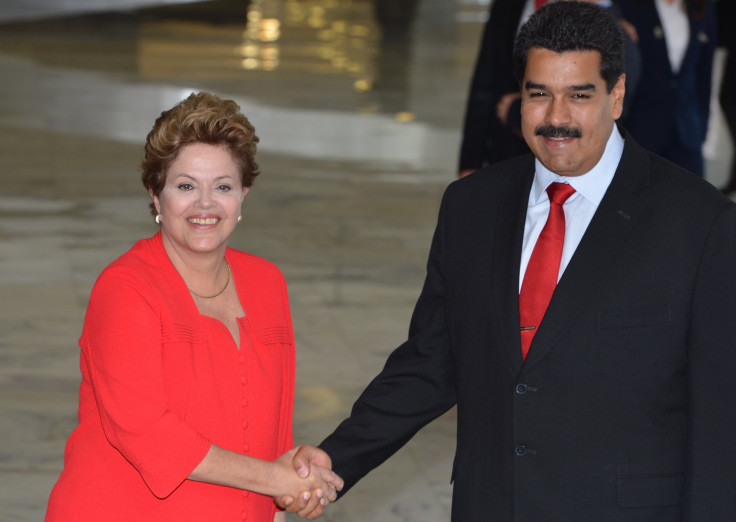Brazil's President Dilma Rousseff Urges Brazilian Businesses To Increase Trade With Venezuela

Dilma Rousseff is worried about Venezuela. The president of Brazil wants to help the fellow nations of Mercosur -- the economic and political agreement among Argentina, Brazil, Paraguay, Uruguay, Venezuela and Bolivia that promotes free trade and the movement of goods, people and currency among its signatories -- but Brazil, despite being the largest economy in the South American group, is currently in no position to offer help. Therefore, Rousseff has turned to the people who can actually do something by urging businesses in her country to increase trading with Venezuela.
Fernando Pimentel, the Brazilian Trade and Industry Minister, promoted the decision during a trip to Caracas in October. Pimentel met with Venezuelan President Nicolás Maduro to discuss the Venezuelan economic situation, which is affecting Brazil, as Venezuela is one of Brazil’s main trade partners.
Pimentel asked Maduro to make sure his government is more diligent in paying exporters, particularly since Rousseff wants Brazilian traders to increase their business with Venezuela, Caracas newspaper El Universal reported. The Brazilian government will not help Venezuela directly in the form of loans or any other official investment, but it will help business owners who wish to deepen their relationship with Venezuela.
“The Venezuelan government wants to build up a large stock of groceries and other goods that would help them fight the scarcity crisis they have right now,” said Pimentel. “That is where Brazil comes in.”
Brazilian newspaper O Globo reported that Maduro’s administration owes Brazilian exporters around $8 billion, of which $1.5 billion is related to the purchase of Brazilian products. The debt accounted for a 16.5 percent decline in the export from Brazil to Venezuela of key products -- meat, sugar, tires, and aircraft -- in the first half of this year compared to the same period in 2012.
The Brazilian overtures to Venezuela come at a time of tense relations between Brasilia and Washington, and two months after Rousseff canceled her scheduled visit to the White House in protest of revelations that the U.S. had been spying on Brazilian officials, herself included, and Brazilian businesses. Maduro announced on Thursday that he would back Rousseff in the motion she and German Chancellor Angela Merkel, whose phone was also monitored by the U.S., are going to present at the United Nations. "We back the decision to bring the subject of espionage to the United Nations, to stop the U.S. from persecuting other nations," he said during an official appearance at the Presidential Palace in Caracas.
© Copyright IBTimes 2024. All rights reserved.





















